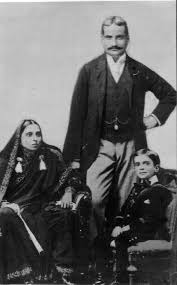Nandlal Nehru: A Life of Dedication and Service
Nandlal Nehru, a name closely associated with the Nehru-Gandhi family, made remarkable contributions to India’s social and educational landscape. As a prominent figure in India’s post-independence era, Nandlal Nehru’s legacy continues to inspire individuals committed to serving the nation. Known for his deep sense of duty and unwavering dedication to societal improvement, he played a significant role in shaping both the cultural and political environment of his time.
Early Life and Education
Nandlal Nehru was born in 1887 in the city of Allahabad, into a family that was deeply rooted in India’s fight for independence. His father, Gangadhar Nehru, was an important member of the local administration, and his family was closely associated with the intellectual elite of the time. Nandlal grew up in an environment that emphasized education, culture, and social service.
He attended Allahabad University, where he earned his degree. The university became a strong foundation for his intellectual development, and his early education played a pivotal role in shaping his worldview. With an eagerness to contribute to the larger societal good, Nandlal’s formative years were spent learning about India’s cultural heritage, history, and the complexities of social inequality.
Career and Public Life
After completing his education, Nandlal Nehru embarked on a career that was dedicated to public service. He joined the Indian National Congress and became an active part of the nation’s independence movement. As a leader of the Congress, he worked alongside many of India’s prominent freedom fighters, including his cousin Jawaharlal Nehru, who would later become the first Prime Minister of India.
Nandlal was particularly interested in social reform and education. He realized that India’s path to true independence could not be paved without social and educational reforms. His leadership in these areas helped lay the groundwork for many reforms that continue to have an impact on Indian society.
Nandlal Nehru also became deeply involved in the education sector. He believed that the education system could serve as a powerful tool for uplifting the masses and empowering future generations. His efforts led to the establishment of schools and educational institutions that focused on providing access to quality education for all, irrespective of class or caste.
Contributions to Society
- Advocating for Social Justice: Nandlal Nehru strongly believed in social equality and worked tirelessly to address issues of caste and class inequality. His dedication to these causes earned him a reputation as a champion for the downtrodden.
- Educational Reforms: Nandlal worked on reforming education, ensuring that it was accessible to children across India, particularly in rural areas. He worked to establish schools that catered to the underserved communities and emphasized the need for basic literacy.
- Cultural Preservation: An advocate for India’s rich cultural heritage, Nandlal Nehru was instrumental in preserving and promoting India’s traditional arts and cultural practices. He believed that the arts were integral to India’s identity and should be preserved for future generations.
- Political Contributions: Nandlal Nehru was deeply involved in the political movement for India’s independence. His association with the Indian National Congress helped shape policies that aimed to unite people across various regions, cultures, and religions, all working towards India’s independence.
- Championing Women’s Rights: Nandlal was an advocate for women’s rights and believed that the empowerment of women was essential for the progress of society. He encouraged education for women and supported their participation in public life.
Daily Life and Personal Philosophy
Nandlal Nehru lived a life rooted in simplicity and discipline. He was deeply dedicated to the cause of nation-building and spent the majority of his time engaged in public service. Despite his prominence, he remained humble and approachable, believing that his work was for the larger good of society. His days were filled with meetings, discussions, and engagement with community leaders.
One of the key philosophies that defined his life was the idea that true change could only come from within. He encouraged others to look inward, focus on self-improvement, and contribute positively to society. This belief in personal growth and collective responsibility became a core tenet of his work.
Legacy and Significance
Nandlal Nehru’s contributions to India have had a lasting impact. Through his work in education, social reform, and culture, he laid the foundation for many of the nation’s post-independence policies. His efforts to empower women, improve education, and promote social justice remain central to the values of modern India.
In addition, his relationship with his cousin Jawaharlal Nehru helped shape the political direction of the country. Nandlal’s advocacy for social equality and justice influenced many of the decisions that would later be made by India’s first Prime Minister. His legacy continues to be felt in India’s commitment to equality and inclusive growth.
Frequently Asked Questions (FAQs)
Q1: What were Nandlal Nehru’s most significant contributions? Nandlal Nehru made substantial contributions in the fields of social justice, education, and cultural preservation. He advocated for equal access to education, particularly for women and marginalized communities, and played a key role in the independence movement.
Q2: How did Nandlal Nehru influence the education system? Nandlal Nehru was a strong proponent of educational reforms. He focused on improving literacy rates across India, especially in rural areas, and worked to establish schools that were inclusive and accessible to all.
Q3: Why is Nandlal Nehru considered a significant figure in India’s history? Nandlal Nehru is considered significant for his role in the Indian independence movement, his efforts to bring about social reform, and his dedication to education and women’s rights. His contributions have left a lasting impact on Indian society and politics.
Conclusion
Nandlal Nehru’s life was marked by a deep commitment to public service and social change. His unwavering dedication to India’s educational, social, and cultural development makes him a towering figure in the country’s history. His legacy continues to serve as an inspiration for all those working to create a more just and equitable society. Through his work, Nandlal Nehru helped build the foundation for modern India and contributed to shaping the nation’s values of freedom, equality, and progress.










